
the official magazine of Volume 16 Issue 1 | Summer 2023 Looking BackReaching Forward ON THE MOVE MCEC® TM ®
MCEC supports all militaryconnected children by educating, advocating, and collaborating to resolve education challenges associated with the military lifestyle.
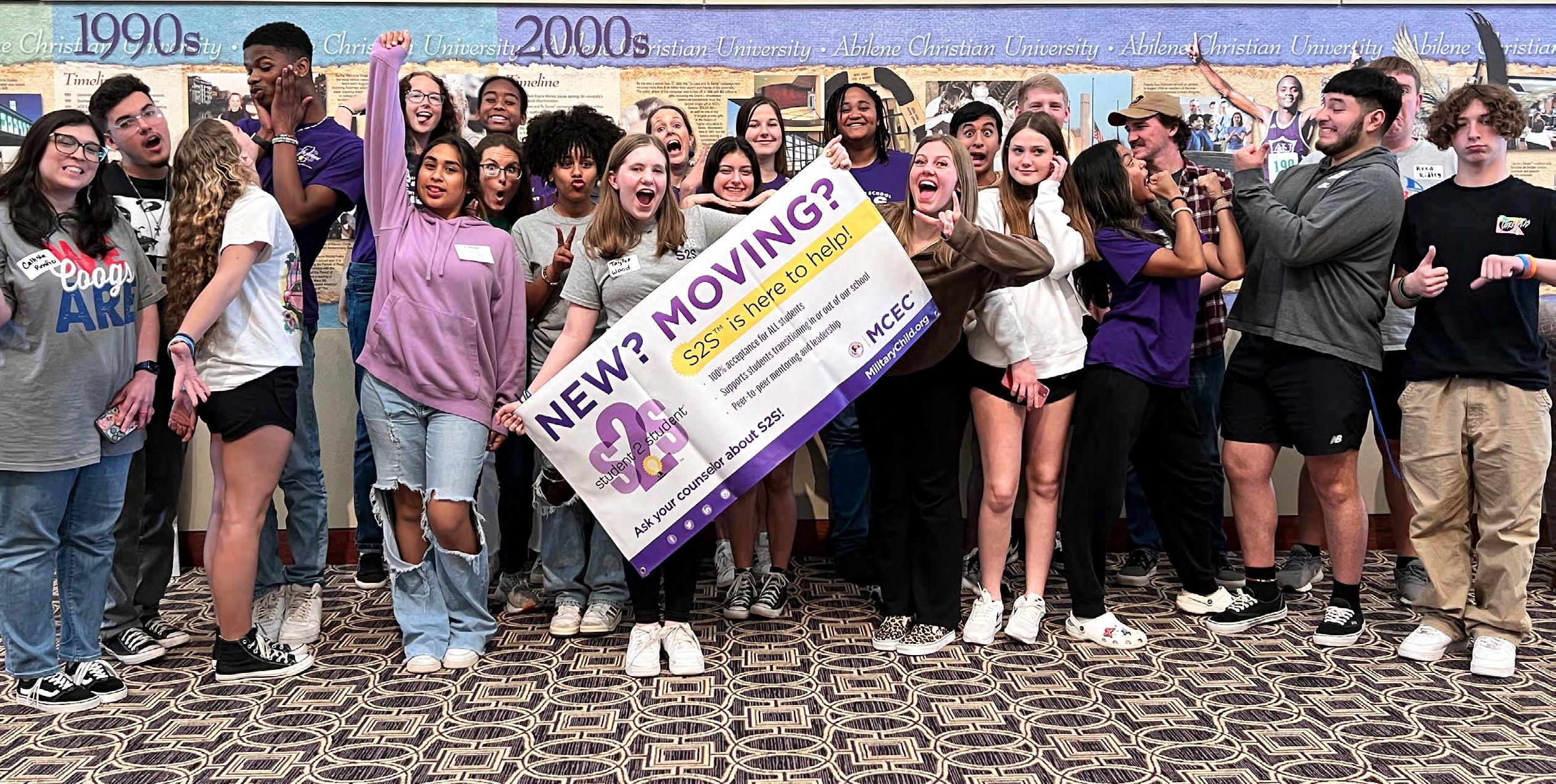
Every military-connected child is college-, work-, and life-ready.
MCEC remains committed to meeting our Mission and Vision through collaboration, integrity, relevance, and service.


give.org
acknowledgment of the source.
01. OUR MISSION 02. OUR VISION 03. OUR VALUES
Military Child Education Coalition®, MCEC®, and associated programs, institutes, trademarks and design elements are owned and licensed by the Military Child Education Coalition. TM/© 2021 Military Child Education Coalition. All Rights Reserved. Reproduction of this magazine, in whole or in part, is authorized with appropriate
® ACHIEVEMENTS charitynavigator.org
Military Child Education Coalition®
BOARD OF DIRECTORS
Officers
Admiral (Ret) Cecil Haney, Chair
Patrick Bingham, Ph.D., Vice Chair/Treasurer
Cortez Dial, Ed.D., Vice Chair/Secretary
René Carbone Bardorf, Vice Chair
Colonel (Ret) Eric M. Flake, M.D. , Vice Chair
Major General (Ret) Robert Ivany, Ph.D.
Vice Chair
Jerrod Wheeler, Ed.D.
Vice Chair
Members
Gina Allvin
Command Sergeant Major (Ret) Donna Brock
Becky Cederholm
Major General (Ret) Dawne Deskins
Lucy Reilly Fitch
Alissa Harrison, D.M.
Anne Haston
Susan Moore
Mary Claire Murphy
Debra Wada
Eric Waldo, J.D.
Members Emeriti
Cathryn Franks
Brigadier General (Ret) Robert Gaylord
General (Ret) Benjamin Griffin
William Harrison, Ed.D.
Lieutenant General (Ret) Don Jones
Mary Keller, Ed.D.
James Mitchell, Ed.D.
Kathleen O'Beirne
Robert Ray
Mary Jo Reimer
Sandy Schwartz
General (Ret) Thomas A. Schwartz
Patricia Shinseki
Lieutenant General (Ret) H.G. "Pete" Taylor
Zoe Trautman
Joyce Ward
NATIONAL ADVISORY COMMITTEE
Ms. Charlene Austin
The Honorable Valerie Baldwin
Ms. Patricia “Tosh” Barron
The Honorable Carolyn H. Becraft
General (Ret) B.B. Bell
Major General (Ret) Charles Bolden, Jr.
Mr. Scott Bousum
Commander (Ret) Brunhilde K. Bradley
Dr. Chuck Brooks
The Honorable John Carter and Mrs. Carter (Erika)
General (Ret) and Mrs. George Casey (Sheila)
General (Ret) and Mrs. Peter Chiarelli (Beth)
Lieutenant General (Ret) and Mrs. Kurt Cichowski (Laura)
Dr. Daniel Domenech
The Honorable Chet Edwards and Mrs. Edwards (Lea Ann)
General (Ret) Tommy R. Franks
Vice Admiral (Ret) and Mrs. William French (Monika)
Ms. Regina Pedigo Galvin
The Honorable Pete Geren
Mr. Roy Gibson
The Honorable Robert L. Gordon III
Major General (Ret) Gus L. Hargett, Jr.
Mr. David G. Henry, Esq
Rear Admiral (Ret) and Mrs. Leendert Hering (Sharon)
Colonel (Ret) and Mrs. Anthony R. Hernandez (Jennifer)
General (Ret) James T. Hill and Dr. Toni Hill
Lieutenant General (Ret) and Mrs. William Ingram (Lil)
Ms. Marianne Ivany
Lieutenant General (Ret) and Mrs. Darrell Jones (Holly)
Mr. Gary Knell
General (Ret) and Mrs. Leon J. LaPorte (Judy)
General (Ret) and Mrs. Craig McKinley (Cheryl)
Mr. Drayton McLane, Jr.
Lieutenant General (Ret) and Mrs. Thomas Metz (Pam)
Major General (Ret) and Mrs. Paul Mock (Karen)
Dr. Robert Muller
General (Ret) and Mrs. Richard Myers (Mary Jo)
The Honorable James Peake and Mrs. Peake (Janice)
General (Ret) Dennis J. Reimer
Mr. Reginald Robinson
Mr. Gilbert Sanborn
Dr. Stefanie Sanford
SCIENCE ADVISORY BOARD
Executive Committee
Colonel (Ret) Stephen J. Cozza, M.D., Co-Chair
Patricia Lester, M.D., Co-Chair
Colonel Eric M. Flake, M.D., FAAP
Richard M. Lerner, Ph.D.
Ronald S. Palomares-Fernandez, Ph.D.
Members
Sarah L. Friedman, Ph.D.
Kenneth R. Ginsburg, M.D.
Leanne K. Knobloch, Ph.D.
Jacqueline V. Lerner, Ph.D.
Gregory A. Leskin, Ph.D.
Shelley MacDermid Wadsworth, Ph.D.
Ann S. Masten, PhD, L.P.
Daniel F. Perkins, Ph.D.
General (Ret) and Mrs. Norton Schwartz (Suzie)
Mr. James H. Shelton III
Ms. Barbara A. Thompson
Lieutenant General (Ret) George J. Trautman III
Dr. P. Uri Treisman
Mrs. Ann Utley
The Honorable Rosemary Freitas Williams
MCEC STAFF
Rebecca I. Porter, PhD
President and Chief Executive Officer
Cindy Simerly
Vice President, Advancement
Amanda Woodyard
Vice President, Education Services
Laura Cayton
Executive Assistant and Interim Chief Operating Officer
Lee Ann Deal, CFRE
Director of Development
Tara Gleason
Director of Programs
Juan Agosto
Director of Technology
Shellie Campos, SHRM-CP
Director of Human Resources
Juan Garcia, CPA Comptroller
Karen Kirk
Director of Marketing & Brand Creative
Denise Montana
Chief of Logistics and Retail
ON THE MOVE
Karen Kirk, Editor in Chief
Cindy Simerly, Contributing Editor
Lee Ann Deal, Copy Editor
Netta Killian, Graphic Designer
Brittany Mahlstedt, Media Relations
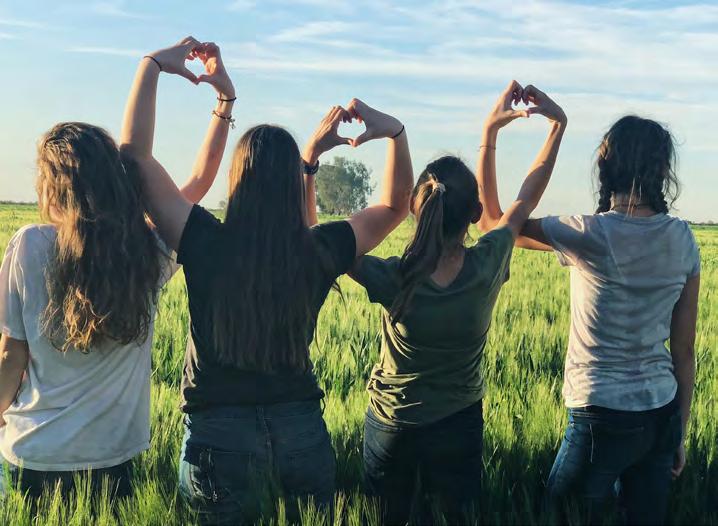
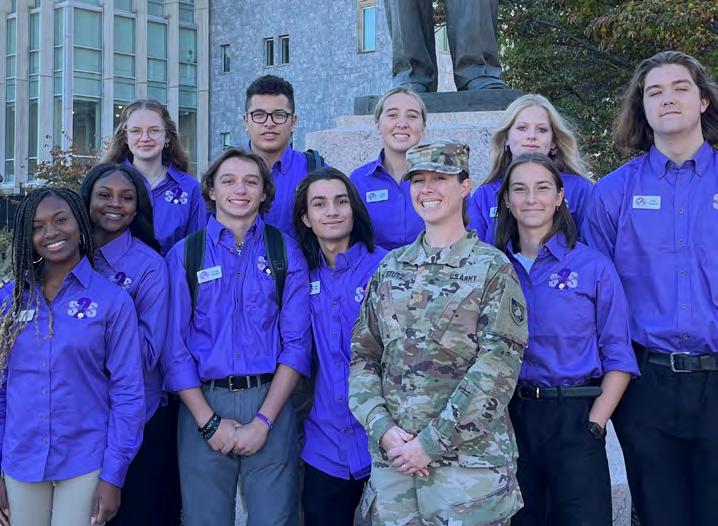

Volume 16 Issue 1 2 ON THE MOVE® tableof contents The views and opinions expressed in articles appearing in On the Move® are those of the contributors and do not necessarily reflect the official position of the Military Child Education Coalition®. 06 FRIENDSHIP MATTERS Military Kids and Thier School-based Friendships 12 5 Ways to #StandByTeens In Support of Teen Mental Health CREATING CONNECTION THROUGH PROJECT ECHO® 04 A Letter from the MCEC Chairman 05 A Letter from the MCEC President and CEO 06 Friendship Matters 08 Top Ten Social Skills Students Need to Navigate Life's Challenges 11 Mental/Behavioral Health Challenges for Adolescent MilitaryConnected Children 12 5 Ways to #StandByTeens 14 MCEC's Inaugural Hidden Helpers Student Leadership Program 16 The Reserve ComponentConnected Family in Your School: Still Invisible 18 Parent's Guide to Peer Pressure 21 Whole Child Wellness 22 The 5 Ws of Supporting MCEC With a Financial Gift 23 The Military Child Well-being Toolkit 24 A Gift in Honor 26 Creating Connection Through Project ECHO® 30 MCEC 360 Summits Introduce Purple Star School Initiatives 26
at 2 at
The Needs that Inspired Us, and the Dynamics that Defined Us

MCEC’s Global Training Summit in Washington, DC, marks the ceremonial launch of the commemoration of our organization’s first quarter century. A lot has happened over these years – learning, achievement, growth –and a lot had to happen before the 25 years even started, to set MCEC’s momentum in motion.
One of the exhibits you can see at the Summit, July 24-26, 2023, at the Renaissance Washington, DC Downtown Hotel, is a stroll-through installation celebrating some of the highlights of the MCEC-at-25 story. It tells how our Coalition has emerged as a model of positive leadership and advocacy for all military children affected by mobility, family separations, and transitions.
The Story Begins ...
Consider how different 1996 was compared to today: So many dramatic events and technology developments had not yet occurred. Think back to a time before the iPhone, social media, broadband internet, or 9/11. Email was just beginning to gain traction.
When MCEC was founded, military-connected students faced differences in educational systems, curricula, and opportunities. Parents and educators across the U.S. and overseas could see the strain caused by students’ frequent moves.
Growing recognition of these concerns led two far-flung school districts –one in Texas, the other in Connecticut – to start the discussions that led to the Coalition we know today.
Let us tell you OUR story – visit www.MilitaryChild.org/history to see an online version of the MCEC-at-25 exhibit.
3 ON THE MOVE® MilitaryChild.org
FROM THE CHAIRMAN

BEING EVERYWHERE ALL AT ONCE
Thereis no one, single solution to the mental health crisis facing children and adults in our country’s military-connected community. Tackling the crisis requires a strategy of pervasive presence – being ready to provide help and support at all times, everywhere possible.
Such an undertaking requires creativity, resolve, and partnership. Partnership is especially essential because the Armed Services’ traditional programs and individual caregivers/loved ones cannot go it alone. They need support, too.
That’s where MCEC working with corporations, foundations, and other donors can make a difference. The Military Child Education Coalition’s mental health and wellness programs are highly respected and their effectiveness has been well documented by mental health professionals and by the Armed Services. Financial contributions – in the form of donations or sponsorships – enable MCEC’s work in these areas to make life-changing, and sometimes life-saving, differences for military-connected families and children.
Our 25th Annual Global Training Summit – to be held in Washington, D.C., July 24-26, 2023 – is a prime example of our work serving military-connected children, their parents, and the professionals who support them. It also provides an ideal, meaningful sponsorship opportunity. The Summit brings nationally regarded subject matter experts together to provide students, parents, educators, and administrators the training they need to most effectively support military children.
I hope you will join us at the Summit – both with your presence and by your partnership.
Cecil D. Haney Admiral, United States Navy (Retired) Board Chair, Military Child Education Coalition

Volume 16 Issue 1 4 ON THE MOVE®
FROM THE PRESIDENT & CEO
THIS MOST IMPORTANT OPPORTUNITY OF YOUR SUMMER

Ournation is responding to widespread mental health challenges. At MCEC, we represent thousands of children and families who find themselves dispatched to the far corners of the world following their service member as they protect our country’s interests.
Among these dedicated Americans, you’ll find every ethnicity, faith, identification, and situation you might imagine. The children in these families are part of their parents’ support systems, sometimes even as caregivers. We believe it is mission critical for us to be supportive to all who serve. These are matters of national interest … and simple courtesy, compassion, and respect. These families have earned our support.
Supporting mental health and well-being are vital for our service members and for military children. The stresses of military service and of the upheaval faced by family members do not have to lead to loss or heartache. There are systems in place to help, but the most effective tool is likely the loving support of family and friends. And we at MCEC count ourselves as friends to all America’s military families.
Mental health and well-being will take center stage for us this summer in Washington, D.C. MCEC will mark its 25th Anniversary at our Global Training Summit (GTS), July 24-26. The Summit, which offers outstanding professional development opportunities for educators and administrators, will have a special strand devoted to Mental Health and Well-Being.
This focus will share ways to navigate the nuances of connectedness, well-being, resilience, belonging, and mental health challenges. All educators, parents, and professionals know that mental health and academic performance are inextricably intertwined. The 25th Annual GTS will, once again, have a fascinating slate of distinguished speakers, some of the world’s foremost experts, to teach you strategies to provide growth skills, support, and opportunities to the military-connected children in your life.
We hope to see you in Washington, D.C., or online for our available virtual sessions. Visit MilitaryChild.org/gts to register and for more details.
Dr. Becky Porter President and Chief Executive Officer, Military Child Education Coalition

5 ON THE MOVE® MilitaryChild.org
FriendshipMatters
Military Kids and Their School-based Friendships
Allyoung people need to feel that they matter, that they are supported by family, friends, classmates, and school adults, but for military kids, that friendship and support at school goes an especially long way. By the time they get through high school, most military kids will have attended 6 to 9 different schools. Some attend schools on base, but most (nearly 80%) of our nation's 1.4 million military children are enrolled in public schools.
Adolescence is a time of tremendous change: physiobiological, social-emotional, dramatic shifts in academic expectations, and social environmental changes, to name a few. During these formative years, friendships become more intimate, new friendships form, and old ones fall away.

WHAT DOES THE RESEARCH SAY?
Supportive environments are known protective factors for military kids. Academic outcomes for military-connected children improve when they have strong social support networks. School peers have been found to be especially important during early adolescence as friends begin to exchange more consequential knowledge and attitudes about school that influence future academic outcomes. This made me wonder… What does this mean for military-connected kids?
Much of the research on militaryconnected kids focuses on how frequent moves contribute to risk, but new research suggests as kids move more they may actually benefit by developing resilience. In my own research at a military-dense public school in
BY ALISON BLACK, ED.D. UCSD, Education Studies

Southern California, I found no clear relationship between number of moves and GPA, possibly supporting the resilience theory. I did, however, find a relationship between the number of parental deployments and lower GPA. Anyone who has experienced deployment understands cycles of stress and disruption of family separation. And yet, during focus groups, kids told a story perhaps less understood by many researchers and educators. They described the challenges of moving often as having led to new strengths, like adaptability, independence, and social skills needed to make new friends. Friends helped them find laughter and meaning even on their toughest days. They detailed the benefits of having both militaryconnected and civilian friends. Their civilian friends helped them join the soccer team or shared their favorite teachers. Their military-connected friends “just got them” and understood what they were going through.
What I realized then was that many kids are more intentional than we think about their schoolbased friendships, and we can help
Volume 16 Issue 1 6 ON THE MOVE®
Taking Stock
• Naming friends: Who are your close friends?
• Reciprocity: Do the people you call friends also call you their friend?
• Commonality: What kinds of things do you have in common? Do you share characteristics, hobbies, interests?

• Diversity: In what ways do you differ? How do your differences enrich each other’s lives?
• Activities: What do you enjoy doing with your friends?
• Support: Who do you go to for homework help? Who can you trust to care about your safety and well-being? Who supports you at school?
• Friend Groups: Are some of your friends also friends with each other? If so, it can increase exchange of ideas and closeness.
them become more intentional if they’re not. Above are some prompts to get us thinking more about our friends and support networks and the role they play in our lives. Remember, it’s more important to have healthy supportive friendships than it is to have a lot of friends or friends with specific traits or social positions.
CLOSING THOUGHTS

As someone who is not myself a military child, I will probably never understand the full extent of their sacrifices. Throughout my years teaching in San Diego, they taught me about humor and courage in the face of adversity. More than anything, they taught me about the importance of our friends and finding our own
social support networks despite (and because of) our challenging circumstances.
It’s important to note that not all children have the same social agency. Schools, community organizations, and families can help! There are wonderful interventions like S2S and online tools to connect families before, during, and after moving school communities. Some eighth-graders I spoke with felt a sense of stigma with lunch clubs, needing help making friends. We may need to get creative to lend social support to all military kids so they can form authentic, meaningful connections at school.
If we all devote time and resources to getting to know our military (and all of our) students on a deeper level, we can make a profound impact on their daily lives. We can help our military kids reflect on the kinds of friends they might like to make when transitioning schools, and we can remind them to keep an open mind, because friendships aren’t always a result of common experience, background, or interests. Sometimes, we just find a kind, welcoming voice in the crowd, and that matters.

7 ON THE MOVE® MilitaryChild.org
Join Alison at the MCEC Global Training Summit in Washington, DC Friendship Matters: Cultivating Support Networks in Civilian Schools Wednesday, July 26, 2:45-3:45 p.m. (Virtual)
TOP TEN
social skills students need to navigate life challenges
 BY DR. ERIC M. FLAKE MCEC Board and Science Advisory Board Member
BY DR. ERIC M. FLAKE MCEC Board and Science Advisory Board Member
Today, social skills play a critical role in the success of young individuals. Unfortunately, in recent years COVID-19 causing social distancing has impacted the development of social skills.

Communicating effectively and interacting with others is crucial for building healthy relationships and achieving personal life goals. This article highlights the top 10 social skills young people need to develop for a successful, socially engaging future. The skills listed below emphasize research conducted by professors who created the Social Skills Improvement System and Classwide Intervention Program, where over 100 classrooms identify the following critical skills as essential for young people to learn.
1
LISTEN UP:
Listening is perhaps the most critical social skill. It allows individuals to understand and respond appropriately to the needs of others. Joint attention is developed since infancy and continues to grow as the complexity of relationships grows. Therefore, young people must continue practicing listening actively and asking clarifying questions to enhance the discussion.
2 FOLLOW 1, 2, 3: Following instructions and completing tasks are essential for success at school and in home life. Learning the importance of following steps in order and developing the ability to value the progression of stepwise approaches reduces anxiety and augments security.
3
BE A RULE FOLLOWER:
Rules are essential for maintaining social order and building trust in group settings. Understanding how following rules benefits everyone — especially yourself — in a community is optimal for holistic development. Teaching how to follow the rules and regulations while expressing individuality is also a vital component of this principle.
4 STAY FOCUSED: Distractions can derail progress and lead to frustration. To help young people stay focused, conducting exercises to improve their concentration and teaching them to identify and ignore distractions that may hinder their progress is critical in helping them stay focused.
5
WE ALL NEED TO ASK FOR HELP:
Asking for help is an essential social skill that helps individuals achieve their goals. It also creates a bond between the helper and the person asking for help. Being willing to provide support in return is also a critical element. Recognizing when to seek assistance and what tools and resources to employ to ask for help effectively leads to success.
9 ON THE MOVE® MilitaryChild.org
6
TALKERS TAKE TURNS: Effective communication involves the reciprocal interaction of active listening and then sharing ideas. Learning the interplay of how to take turns when speaking, listen actively, and respond appropriately is an intricate dance that only gets better with intentional practice.
7

BE NICE: Getting along with others is essential for building solid relationships. Praising and promoting teamwork, empathy, and cooperation results in positive relationships.
8
Developing social skills is an essential developmental skill that is necessary for people to thrive. These skills must develop and nurture throughout childhood and be maintained as adults. The ten social skills listed above are crucial for building strong relationships, achieving success, and contributing positively in groups and community settings. By highlighting these ten critical skills, young people can then utilize tools and resources to develop these skills and continue to grow as more confident, empathetic, and socially-competent individuals.
For additional information on these 10 social skills please refer to PEAK (thepeakproject.org) and PEERS (semel.ucla.edu/peers)
• Positive, Engaged, Achieving Kids (PEAK) is a national study to evaluate the effectiveness of a classroom social skills curriculum in early elementary grades.
• Program for the Education and Enrichment of Relational Skills (PEERS®) provides evidence-based social skills treatment to preschoolers, adolescents, and young adults with autism spectrum disorder (ASD), attention deficit/hyperactivity disorder (ADHD), anxiety, depression, and other socioemotional problems.

9 BE RESPONSIBLE: Taking responsibility for one’s actions is an essential social skill that builds trust and respect. Learning from an early age to take responsibility for one’s behavior, learn from mistakes, and make amends when necessary are the hallmarks of having a healthy social growth mindset.
10
JUST SERVE: Kindness and empathy are essential social skills that help individuals build positive relationships and create a supportive community environment. Therefore, we must act kindly and seek opportunities to help others.
Volume 16 Issue 1 10 ON THE MOVE®
BE CALM: Emotional regulation is an essential social skill that helps young people respond to challenging situations calmly and rationally. Managing emotions, building resilience, and coping with stress are necessary for social development.
Join Dr. Eric Flake at the MCEC Global Training Summit in Washington, DC Communication ChallengesThe post COVID Pandemic Tuesday, July 25 10:30-11:30 a.m.
Health
Challenges for Adolescent Military-Connected Children

A few recommendations are:
BY LISA HOWARD
Oneof the most difficult roads to navigate with teenagers is when to prioritize mental health resources. The teenage years present a myriad of challenges for parents, and it is important to know when it is time to get additional support.

What does “normal” really look like in a phase of life that often encourages conformity and masking?

Military teens face many unique challenges such as frequent moves, losing relationships with friends, separations from loved ones, and the expectation to be resilient all the time. Most military children are referred to as “dandelions,” but as they get older, they hit the complexity of adolescence — those seeds get harder to plant and they long to establish their identity.
And that is okay! They become more like a willow tree in adolescence, needing to plant their roots and let their branches start to grow.
Military teenagers are unique in that they are rooted by their families, and they rely on those families for support, guidance, and most importantly, help in a crisis.
As parents, guardians, and military community members, it is essential to provide resources and support to those families who need just a little help as well as those who are in crisis mode. Knowing where and how to find resources can be daunting.
As a team member with The Barry Robinson Center, I look forward to sharing our resources to add to the toolbox. You can find us at www.barryrobinson.org Remember, we got your six and you don’t have to go through this alone!
1. Start with your Primary Care Manager and have your teen evaluated for physical and mental changes. All referrals to specialty services starts here, to include evaluations, short- and long-term care.
2. Tap into resources that the military already has in place through Military OneSource, communitybased programs, and school services.
3. Remember, if you feel your teenager is in crisis, never hesitate to take them to the ER!
4. Finally reach out to your military tribe. There are many resources out there and often it’s your tribe that can share those experiences best. Personally, it was a Facebook post from one of my tribe members that lead our family to a crucial needed level of care.
11 ON THE MOVE® MilitaryChild.org Mental/Behavioral
Join Lisa Howard at the MCEC Global Training Summit in Washington, DC Building Your Mental Health Toolbox: For Your Family and Your Military Community Tuesday, July 25, 10:30-11:30
a.m.
The Barry Robinson Center
MCEC is grateful to the Barry Robinson Center for being the 2023 Global Training Summit conference bag sponsor.
Ways to #StandByTeens
in Support of Teen Mental Health

Center for Parent and Teen Communication / Supporting Emotional Health
BY
The country is paying attention to teen mental health — and rightfully so. Young people with emotional distress deserve full and focused attention. There is a problem, and we must talk about solutions and offer strategies that empower parents and teens. However, too many stories being told about teen mental health mistakenly paint the entire generation in crisis rather than recognizing its strengths.
This is a great generation. Youth are contributing to our communities and committing to building a better nation. Most young people have been resilient through stressful times. Often teens experience strong emotions precisely because they possess strengths like sensitivity and caring. They will thrive when they are supported to navigate their current discomfort and ultimately learn to manage the power of their emotions. Teens thrive when we build upon their strengths. We must empower parents with the knowledge of how much they matter in their teens’ lives. Adults must possess both the strategies to help young people thrive and the steps to take when they think a teen
is having mental or emotional distress. Professionals can and do help. Strong relationships and open communication position families to serve as guides to their children in the journey towards adulthood. Families with strong relationships are also poised to address mental health and emotional challenges. It’s not uncommon for teens to encounter challenges during adolescence. Supportive parenting is about being there when problems arise. If you’re worried or have a feeling something is wrong, take it seriously. Many parents who believe their child is acting out to “just get attention” feel as though the best strategy may be to ignore the attention-seeking behavior. If

Volume 16 Issue 1 12 ON THE MOVE®
5
“Supportive parenting is about being there when problems arise.”
DR. KEN GINSBURG Pediatrician and Member of the MCEC Science Advisory Board
your teen is asking for attention it is because they need you. Give them the time and attention they’re looking for.
There are many things parents can do to support teen mental health. Here are five ways you can stand by teens now:
1. Practice balanced parenting and express love. A balanced parent expresses love clearly while still setting boundaries. They create a home environment that feels like a sanctuary and lets teens feel comfortable sharing their emotional lives. They offer unconditional love and acceptance. This is the most protective force in a teen’s life. When a teen knows they are loved by the person who knows them best –both their strengths and challenges – they are more likely to share their struggles and ask for help.
2. Understand teen emotional development. It would be hard to know if your teen is struggling with their mental health if you aren’t sure what the typical range of emotions is in adolescents – or when there may be a cause for concern. Teens often experience stronger emotions during puberty. This is because the part of their brain that experiences emotions develops rapidly during adolescence. You don’t have to be an expert or have all the answers. Instead, focus on being a good sounding board. Talk with your teen in a way that guides them to open up and calms their emotions. Taking this approach will help your teen feel safe.
3. Learn the signs of teen anxiety and depression and when to seek professional help. It’s important for parents to know the signs of adolescent depression and anxiety. These signs may not look the same in teens as in adults. For example, teen depression may present with sadness, but could also appear as anger, rage, or outbursts. Parents are a key part of recognizing when their teens may need to seek professional help and are critical in getting them to the people trained to support teens to feel better. If you or someone you know needs help, call, text, or chat 988 or visit 988lifeline.org where you can find other resources.
4. Commit to building your teen's resilience. The best strategy to help teens continue to build strengths while being prepared to handle life’s curveballs is to help them manage stress in healthy ways. It’s difficult to watch children struggle. To best care for them, you must know how to take care of yourself. By doing so, you serve as a model for teens. Your children will feel
more secure because they care about your well-being. Let them see how you prioritize and manage your mental health and emotional well-being. Don’t let your stress impact their stress. Dial down catastrophic and self-destructive thinking. By showing how you cope, you help your teen learn to build resilience, which will help them bounce back from troubling times.
5. Acknowledge the external forces teens are navigating that impact their mental health. Our teens are dealing with a lot, from social media pressures to cyberbullying to societal issues like COVID-19, injustice, politics, and even war. It’s no wonder that so many teens are feeling a weight on their shoulders. Whether your teen is struggling with common issues like school or peer relationships, or navigating societal issues like racism and discrimination, be there to offer support. You matter in your child’s life, even if it feels like they may be pushing you away. This may be an opportunity to draw from family values and cultural strengths or limit their exposure to the causes of their stress.
It’s more important than ever to stand by teens. This generation has learned the power of human connection. They want to create change and improve the world we live in. More young people are demonstrating their strength and sensitivity by being open to talking about mental and emotional health. And, they’ve shown themselves to be resilient. Now it’s up to parents and caring adults to support them to thrive in both good and challenging times. Investing in teens today creates stronger, more connected communities tomorrow.
Join us in a movement to build a resilient generation prepared to lead us into the future. Support teen mental health and well-being by sharing this article and tagging #StandByTeens.
For more, follow us on Instagram @parentandteen
13 ON THE MOVE® MilitaryChild.org
Join Dr. Ken Ginsburg at the MCEC Global Training Summit in Washington, DC Supporting Teen Mental Health Monday, July 24, 6:30-8:30 p.m. Content provided courtesy of the Center for Parent and Teen Communication, Children's Hospital of Philadelphia. © 2023 The Children’s Hospital of Philadelphia. All rights reserved.
MCEC’s Inaugural Hidden Helpers Student Leadership Program
This program was made possible through a generous grant from the Wounded Warrior Project®, and in partnership with the Elizabeth Dole Foundation.


“Congratulations to these outstanding young people on their selection to attend the inaugural Hidden Helpers Student Leadership Program,” said MCEC President and CEO Dr. Becky Porter.
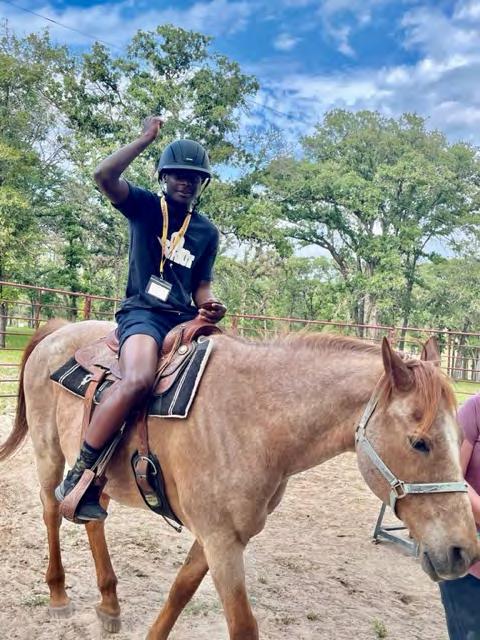 BY KAREN KIRK MCEC Director of Marketing and Brand Creative
BY KAREN KIRK MCEC Director of Marketing and Brand Creative
MCEC welcomed ten students from across the United States to the inaugural Hidden Helpers Student Leadership Program (HHSLP) at the University of Texas San Antonio (UTSA), April 14-19, 2023.
Hidden Helpers is an initiative of the Elizabeth Dole Foundation created in 2021 to recognize and support the children and young adults (up to age 18) who are part of America’s 5.5 million military caregiver families.
MCEC established the HHSLP to identify and enable high schoolaged Hidden Helpers to spend five days with other youth caregivers, identifying resources for help and building leadership skills to prepare for life after high school. The event provided a fun, youth-centered opportunity for these military kids to connect, build lasting friendships and continue to support each other virtually after their time together came to an end.
“The challenges faced by children in caregiving families are too often unknown or unrecognized. That can be tremendously isolating. MCEC is excited to offer this experience because it enables these amazing youth to benefit from peer connections and support that they need and deserve. It’s wonderful to see them explore opportunities in education and life as they grow into adulthood.”
The Hidden Helper students toured UTSA’s various departments and dorms, and learned about its majors, financial aid, and support for military families. Dr. Thomas Porter, professor at UTSA, held a two-day workshop, “Storytelling: Hidden Helpers’ Unseen Journey of Healing,” in which participants were encouraged to author their personal stories to help process and understand their experiences and feelings. The students could share their stories with each other if they wished, which helped them see that they are truly not alone — there are others who can relate, and who care.
The mayor of San Antonio, Ron Nirenberg, proclaimed April 15th “Hidden Helpers Day.” Mrs. Juanita Sepulveda, former Marine and current member of the City of San Antonio Military Council, presented the proclamation and individual certificates to each student.
Volume 16 Issue 1 14 ON THE MOVE®
“I wanted my son to have this trip attendee. “He spends so much time and learning about himself.”
On April 18, the University of Texas at San Antonio honored HHSLP participants by presenting a commemorative brick to be embedded in the UTSA PASEO, the major walkway on campus.

The HHSLP is intended to become an annual leadership opportunity for high school students who are in a caregiving role for a wounded, injured, or ill parent from service in the military.





One student commented, “The [program] allowed me to make friendships that I hope will continue to blossom and strengthen as time progresses. I want to extend my gratitude to those outside our circle who ensured we could have this experience, the Wounded Warrior Project, and the executives at MCEC. I want to emulate the impact you and the program have made on my future.”
Students selected to attend the HHSLP were in grades 9-12; have military-connected affiliations to the U.S. Army, U.S. Marine Corps, U.S. Navy, and U.S. Air Force; and represented seven high schools from five states across the country:

• Parrish Community High School
Parrish, Florida
• American High School
Plantation, Florida
• Pinecrest High School
Southern Pines, North Carolina
• Samuel Clemens High School
Schertz, Texas
• North Stafford High School
Stafford, Virginia
• Stafford Senior High School
Stafford, Virginia
• Medical Lake High School
Medical Lake, Washington
15 ON THE MOVE® MilitaryChild.org
trip just for himself,” said the parent of one time helping. He had a great time making friends
The Reserve ComponentConnected Family in Your School: Still Invisible
BY MAJ. GEN. (RET) MARGARET C.
WILMOTH, Ph.D., MSS, RN, FAAN UNC Chapel Hill
COL. (RET) MARGARET A. COPE ROA STARs Foundation

ALICIA ROSSITER, DNP, APRN, FNP, PPCNP-BC, FAANP, FAAN University of South Florida
LT COL. (RET) CATHERINE LING, Ph.D., FNP-BC, CNE, FAANP, FAAN Johns Hopkins University

Children of both active and reserve military members have experienced the overseas deployment of one or both parents and lived the anxiety associated with that deployment over the past 20 years. Even though the wars in Iraq and Afghanistan have ended, service members are still routinely deployed across the globe. Schools provide much in the way of support during these stressful times, and those adjacent to active-duty military bases are well versed in the military culture and the stress and anxiety that surrounds deployments. Reserve Component(RC) connected children and families generally do not live in these military communities, rather they live in more typical “civilian” ones. School staff in these civilian-centric communities are not as well-attuned to military culture as are those in military-centric ones. Yet RC children require the same levels of support and understanding as their active component (AC) counterparts.
Unfortunately, much of what is known about the impact of deployment
WILMOTH COPE
on children has been done from the perspective of AC children1. A recent report2 found that RC-connected children reported as much as, if not more, anxiety and other behavioral issues than those from active-duty families but had access to far fewer resources. This scoping review reduced 1,079 publications to a mere 17 having been published between 2002-2017 that focused on RC children who had a parent deployed during this time period. This paucity of peer reviewed studies examining the impact of deployment on RCconnected children underscores their invisibility. Not being seen does not equate to not having needs.
The invisibility of RC families and children extends beyond the policy level. Community groups, schools, and institutions are not aware of the child’s changes in status (from routine civilian to military-connected) that occur with a parental deployment. The activated RC parent is suddenly not available for extended periods of time. The family may experience significant economic

Volume 16 Issue 1 16 ON THE MOVE®
changes and decreased resources with disruption of household routines, income streams, and parent availability. Not only are these children invisible as militaryconnected; the military lifestyle and culture are invisible to these children. They have not experienced the day-to-day realities of a parent on active duty. They have not lived with the mores and expectations of dayto-day military life. Deployments bring new roles and responsibilities at home along with uncertainties for the safety of the service member. For active duty-connected children, these uncertainties and changes are risks that are mitigated by the at-home parent or caregiver. If this parent has healthy and positive coping skills, the child is most likely to experience resilience. It is not known if having a resilient caregiver in the RC child’s home is a mitigating factor during deployment due to the lack of research with this population.
RC children do have schools as a potential mitigating factor from the stress of parental deployment. These children are generally well established in their schools and communities, but it cannot be assumed that their military-connected needs are known. A recent scoping review of educational and support programs designed solely for RC children found only four papers from 1,118 published papers between 2001-2023 that addressed this need3 The Purple Star program was designed to help schools respond to the educational and social-emotional challenges militaryconnected children face as they change schools. Schools in any location can achieve the Purple Star designator if they have the required support systems. The vast majority of schools with this designation surround active-duty installations (MilitaryChild.org/ purplestarschools) and have a deep understanding of their needs. RC children are less likely to benefit from these supports as the Purple Star designator is less commonly awarded to schools in other geographic locations.
The Reserve Organization of America STARS Foundation (Standing Together for America’s Reservists) created the ‘STARSinSchools’ program (StarsinSchools.org) and stepped in to fill this gap. This program was created as a mechanism to inform schools about the unique needs of children of deployed RC service members and to serve as a resource for educators and parents. Over 5,000 ‘STARS in Schools’ Kits have been distributed around the country at Yellow Ribbon Briefings that occur throughout the deployment cycle. There is much work to be done to fill the policy, system, and program gaps to reduce the invisibility experienced by RCconnected children so that we can ensure that their educational, emotional, and health care needs are met, just as is done for their active duty counterparts. They serve, too.
1. Chartrand, M. M., Frank, D. A., White, L. F., & Shope, T. R. (2008). Effect of parents’ wartime deployment on the behavior of young children in military families. Archives of Pediatrics & Adolescent Medicine, 162(11), 1009–1014. https://doi.org/10.1001/archpedi.162.11.1009
2. Veri, S., Muthoni, C., Boyd, A.S., Wilmoth, M.C. (2021). A Scoping Review of the Effects of Military Deployment on Reserve Component Children and Families. Child and Youth Care Forum, 50, 743-777. https://doi.org/10.1007/s10566-020-09590-1.

3. Phonyiam, R. & Wilmoth, M.C. (under review). Education and Support Program Design for Reserve-Connected Children: A Scoping Review.



17 ON THE MOVE® MilitaryChild.org
Join us at the MCEC Global Training Summit in Washington, DC The Reserve Component-Connected Family in Your School: Still Invisible Tuesday, July 25, 1:15-2:15 p.m.
"Reserve
Component (RC) connected children and families generally do not live in these military communities, rather they live in more typical
“civilian” ones".
ROSSITER LING
Peer Parent’s Guide to Peer Pressure
SUPE EDITORIAL TEAM
he definition of peer pressure has remained the same: a feeling that one must do the same things as other people of one’s age and social group in order to be liked or respected by them. This can be negative or positive.
The way teens are pressured negatively has changed significantly over the decades. The internet is forever. In the digital age, the result of peer pressure can have lasting consequences. Below is a comprehensive guide for parents with vital information to help teens and speak to them about peer pressure.
Effects of Social Media
&


Why It Can Lead to Peer Pressure
media induces peer pressure through behavioral displays and reinforcement. It then amplifies social desirability. Because the teen brain is actively developing, they are more likely to partake in risky behaviors, which they may have observed on social media platforms.
Social
Every action on social media leaves a robust digital footprint. For example, rejection or negative comments received by peers can be permanent. There is a legitimate fear that ten years later, they could be judged for something they did or said online. It is by these actions they are pressured to conform to their peer groups.
Not only are teens targeted by their peers, but social media influencers can also worsen this peer pressure. Marketing firms specifically target teens because of how easily influenced they are. Decisions are

now primarily affected by social media influencers. Individuals sharing their personal experiences have become the most effective advertising technique.
The problems emerge because teens cannot differentiate between commercial and personal opinions. Because every person with a smartphone has a voice, it often leads to hateful comments, trolling, and cyberbullying. Teens begin to feel they cannot live up to societal expectations and can no longer face rejection. As a result, they give in to peer pressure.

Volume 16 Issue 1 18 ON THE MOVE®
Tips for Parents to Handle Peer Pressure from Social Media

There are many approaches that parents can take to talk about peer pressure from social media. Ideally, any strategy should foster open communication and provide support. Consider the following tips:

Be Approachable
Initially, make sure they know they can talk to you. Never brush aside any conversation, listen to their opinions, answer their questions, share personal experiences, avoid lecturing, and always make yourself available. Doing this will ensure they know they can come to you at any time and know you are the person they can talk to.


Encourage Communication
Encourage them to challenge anything that feels wrong. Teens may often not speak about moral dilemmas and may cave to peer pressure. When parents can encourage them to talk about situations that feel wrong, it will lead to solutions to resolve or avoid the problem altogether. As a result, they become more confident in challenging these situations.

Pay Attention
Pay attention to changes in behavior and mood. Parents need to speak with their kids regularly and understand what sort of content they are consuming. What they see on social media directly impacts their mood, behavior, and actions. Ask them questions about the content, and gain an understanding of why they like it. In addition, set ground rules and screen-free times in the home.
Discuss consequences
Negative peer pressure leads to harmful consequences, legally, emotionally, and financially. Teens who know the consequences of peer pressure are more likely to avoid risky situations or speak up about them before something terrible happens.
Help Your Teen Cope with Peer Pressure
Helping teens cope with peer pressure begins with education and teaching them how to use social media responsibly. Consider the following:
Teach them about self-esteem and assertiveness.
• Being assertive leads to being able to say no like you meant it, whether saying no to an individual or group or saying no to yourself. In the context of social media, it becomes vital to say no to yourself by setting boundaries and limitations on engagement and interaction.
• Having self-esteem helps with making decisions and critical thinking. Social media involves a significant number of individual actions. Before making a decision, ask yourself: Is this good for me? Is this adding something positive to my life? Am I certain how I feel about this? This will also help people avoid making decisions others think are good for them.
19 ON THE MOVE® MilitaryChild.org
Teach them about priorities.
• For example, their peers may prioritize skipping school and making TikTok videos. Yet, they may prioritize getting good grades but are pressured into doing the latter.
• Help them understand their priorities and needs have value and are not for nothing, even if their close friends disagree.
Help them surround themselves with the right people.
• Encourage them to find the activities they enjoy, which can draw them to people with similar interests and mindsets. Help them take part in school activities, sports, or events.
• Guide them toward finding friends they can feel safe with and who provide social support.
Additional Tips
• Discourage and disapprove of behavior that involves bullying, gossiping, spreading rumors, and hateful comments. Speak to them about what is appropriate and safe to share on social media.
• Set clear boundaries and limitations. Show them how to avoid letting social media interfere with sleep, studying, extracurricular activities, sports, meals, and homework. For example, establish healthy bedtime routines that do not involve screen time. Lead by example: parents should follow the same rules they set for their teens.

• Monitor their accounts and let them know you are checking their social media feeds. Set up the accounts initially, and follow through with checking them regularly. This creates accountability and discourages risky behavior.
• Always encourage them to have face-to-face contact with friends and peers. This form of social interaction is critical and will drastically lessen their time spent using social media.

The Evolution of Peer Pressure
Peer pressure has evolved from rumors and face-to-face engagement in a community where someone grew up. It has become random people, close friends, family members, or acquaintances, pressuring one another through social media platforms, often hiding behind a username.
It is constant, regardless of where someone lives.
Teens who face peer pressure today do not have to live in the same community, town, or city as the person pressuring them. Social media means that peer pressure is everywhere all the time. The only way to get a break from social pressure today is to disconnect from social media.
It is no longer about kids pressuring one another to skip school and hang out at the mall. People want to go viral, whether an internet challenge or catching something on video. There is constant pressure to be the next internet sensation, gain more followers, become a social media influencer and seek that social reward.
It is no longer easy to avoid and can be much more challenging to manage and prevent. Fortunately, practical solutions and tips have evolved with time. Parents can still be equipped to help their kids.
Sources:
• www.pewresearch.org/ internet/2022/08/10/teens-social-mediaand-technology-2022/
• www.apa.org/news/apa/2022/socialmedia-children-teens
Reprinted with permission from www.addicted.org/supe/parents/parentsguide-to-peer-pressure
Volume 16 Issue 1 20 ON THE MOVE®
Whole Child Wellness
A strong, healthy body is just one part of being healthy.
BY SESAME STREET FOR MILITARY FAMILIES
Whole child wellness is about children having healthy minds and healthy bodies. This is especially important for military families! When a child is wholly well, they build the confidence and resilience to face changes and challenges of all kinds. There are five areas that make up whole-child wellness:
1. Healthy Body: Parents can model healthy habits and ensure that children eat well, get enough sleep and exercise. Access to parks and playgrounds and quality health providers is also important.
2. Learning/Development: Children need supportive teachers, access to libraries and sports clubs, and opportunities to read and learn at home with family members.
3. Safety: Children must feel safe at home and in their neighborhood, including at school, and they need trustable adults around them.
4. Social-Emotional: A strong parent-child relationship and extended family support and connection to culture/ community are crucial, as is making sure the child feels happy and confident, has friends, and is able to manage emotions.
5. Basic Needs: Children need stable housing, adequate food and clothing, and a general feeling of having their most important needs taken care of.
To have true wellness, children need:
• health care
• nutritious food
• fresh air and exercise
• safe play spaces
• a good learning environment
• a safe and stable home and community environment
• a strong family bond
• support from extended family and friends

• connection to one’s community and culture
• self-confidence and a hopeful outlook
• a sense of purpose and identity
• a positive belief system (this may mean organized religion, but also refers to any shared outlook that builds inner strength, a sense of hope, and a way to make sense of the world)
Parents’ health and children’s health go hand in hand. Military life can put unique stressors on parents, and it’s important to remember you aren’t alone! When children see parents taking care of themselves and modeling healthy habits—such as reaching out for help in making sure the whole family has the things listed above, everyone benefits. But families also need a great health care team. While military families may undergo a Permanent Change of Station (PCS) every couple years, there are still lots of ways to connect with your children’s health care providers. Doctors and nurses can be an important source of information and encouragement for families, and their offices or clinics can be safe places in which parents and children feel comfortable asking questions and talking about what they need in order to be as healthy as they can be. They’re also great places to notice and celebrate children’s healthy growth! Check out these resources on making the most of your child’s health care team, even when your home-base is in transition.
For more free and bilingual resources visit: sesameworkshop.org and sesamestreetformilitaryfamilies.org
21 ON THE MOVE® MilitaryChild.org
The 5 Ws of Supporting MCEC with a Financial Gift
WHY?
To ensure MCEC can grow to help all military-connected children and their families

WHO? Everyone who wants to help military-connected children thrive

WHAT? Contributions of cash, credit card, EFTs, or planned gifts
WHEN? Once, monthly, quarterly, annually – whatever works best for the donor
Where?
In our current landscape, MCEC must rely even more on philanthropic support. Over the past ten years, the percentage of philanthropic support needed to ensure MCEC can fulfill its mission has increased from less than 30% to over 50% and growing. With redirection of much of the public — and even some private — funding to essential needs of food insecurity, housing, and health issues, philanthropic support for the education challenges our military families face is vitally important. MCEC tackles those challenges daily through the generosity of our donors.
MCEC routinely seeks and receives philanthropic contributions from three general sources: corporations, foundations, and individuals. As corporations and foundations shift their areas of focus/interest, are
flooded by non-profits seeking financial support, and in some cases find themselves with less discretionary capital and an explosion of more essential needs to fill, the generosity of individuals is now even more crucial to MCEC. Because MCEC has, in the past, been so generously funded by contracts and grants (federal and state), individuals may view their contributions as simply augmenting our primary funding sources. Although MCEC has increased our efforts to pursue corporate and foundation grant funding, individual philanthropy not only supports our mission financially, it makes a strong statement to our corporate and foundation partners who want to be assured the people who know us best are also supporting us financially.
MCEC is so very grateful to the hundreds of individuals who contribute each year, and we believe there are hundreds more who believe in our mission of supporting all military-connected children by educating, advocating, and collaborating to resolve education

challenges associated with the military lifestyle. Below, in his own words, one individual states why he supports our mission:
"Our four children attended 21 different schools during my years of service in the Army. The educational challenges they faced inspired my wife and I to do all we could to ease the transitions for all military families."
- Robert R. Ivany President Emeritus University of St. Thomas
Did you know?
• There are 1.74 million non-profits vying for limited philanthropic dollars.
• In 2018, less than 12% of taxpayers itemized, reducing their motivation to give philanthropically.
• 30% of all individual giving is to religious institutions.
• Political campaigns can have a profound effect on the amount of money given to non-profits.
Volume 16 Issue 1 22 ON THE MOVE®
Click the QR code to make an instant donation.
The demands of the military lifestyle can be particularly challenging for military children and can take a toll on their social-emotional well-being and development. Frequent relocations, parental and sibling deployments, and exposure to traumatic events such as Post Traumatic Stress Disorder, Traumatic Brain Injury, and physical injuries can put military children at risk.

Recognizing the importance of addressing these challenges, MCEC has developed the Military Child Well-Being Toolkit, a remarkable resource aimed at supporting the emotional intelligence, mindfulness, and overall wellbeing of military-connected youth. Through collaboration with external organizations and subject matter experts, MCEC has created an interactive toolkit that equips parents, educators, and
Empowering Military-Connected Youth
BY SUE LOPEZ, M.Ed. Instructional Design, MCEC
professionals with the necessary knowledge and strategies to effectively support military-connected kids. The toolkit provides essential support in various areas by tackling crucial topics such as diversity, equity, inclusion, and LGBTQIA+ support and by placing significant emphasis on suicide prevention, emotional intelligence, mindfulness, and overall well-being.
What sets the MCEC Military Child Well-Being Toolkit apart is its rigorous, evidence-based approach. The content within the toolkit was meticulously reviewed by Dr. Stephen J. Cozza, Dr. Gregory A. Leskin, Dr. Leanne K. Knobloch, and Dr. Shelley M. MacDermid Wadsworth, members of the MCEC Science Advisory Board, ensuring adherence to the highest ethical standards and best practices for those working with military-connected youth. Drawing upon nationally recognized frameworks such as CASEL, Whole Child Design, S.E.A.D., and the 2021 U.S. Surgeon General’s Advisory on Youth Mental Health, this toolkit comprehensively addresses the unique needs of military children.
Emotional Intelligence
Social
Categories
• Self-Awareness
• Self-Management
• Social Awareness
• Social Skills
• Responsible Decision-Making
The MCEC Military Child Well-Being Toolkit is a beacon of hope for militaryconnected youth. Its evidence-based approach, comprehensive content, and focus on addressing critical issues make it an invaluable resource for anyone – parents, educators, professionals, etc. – seeking to support military-connected children. By prioritizing the social-emotional well-being
of
MilitaryChild.org/wellbeingtoolkit
23 ON THE MOVE® MilitaryChild.org
Disclosure
Statement: The toolkit is not intended to be a substitute for professional medical advice, diagnosis, or treatment. Always seek the advice of your physician or other qualified health providers with any questions you may have regarding a medical condition. Never disregard professional medical advice or delay in seeking it because of something you have read on the MCEC website.
Emotional Learning (SEL) is the process through which children and
acquire emotional intelligence.
adults
of SEL:
military kids, we can ensure they receive the support they need to navigate the unique challenges they face and build fulfilling lives.
A Gift in Honor
Recently, a new donor made a very generous, recurring gift to MCEC. We had not yet met him, but we knew there must be a story behind such a donation. And so, we asked Roy Smith, founder of Viking Tactical Security Group and Viking Executive Protective Solutions, to tell us his story. Here’s what he shared.
BY ROY SMITH
Decades ago, on a Thanksgiving Day, my mother received the call that all families fear: there had been an accident, and my father, T-Sgt. John Samuel Smith, was gone. I was just two years old at the time, too young to fully grasp the magnitude, but the tragedy and its timing changed the fabric of our family gatherings — especially on Thanksgivings — forever. My father will always occupy a special place in my heart. Since I was so young when he died, I don’t have many memories of him, but my mother shared stories that described the man he was, our life together as a family, and how he cared for me. My favorite story is when my father came home from work, he would pick me up, sit in his La-Z-Boy chair, and we would both fall asleep. My mother and dad met in high school, where he was a standout athlete, and fell in love. A few years after he joined the U.S. Air Force, my sister was born and 2 years later, my brother. I was born several years later.
T-Sgt. John Samuel Smith was a man of unwavering integrity, never faltering in his dedication to his team or his family — a characteristic that endeared him to all who knew him, but also contributed to his early passing. Over 14 years, his Air Force career had taken him on deployments to various corners of the world, including Korea, Greenland, and Vietnam. Although he often worked long hours, sometimes up to three back-to-back shifts, he always made time for his family and friends. He would never risk having anyone feel let down. The day of his accident was no exception;

Volume 16 Issue 1 24 ON THE MOVE®
he was exhausted after working multiple shifts. My mother implored him to rest, but his team and dear friends had a crucial engagement — their bowling league’s Championship Match — and he had made a commitment. His principles would not allow the thought of letting his team down. After the competition, though, his exhaustion caught up to him, he fell asleep at the wheel, and his car struck a tree.
As I grew older, I aspired to follow in my father's footsteps and join the military, a path followed by most of the men in our family. However, destiny had a different plan for me. Instead of serving our country, I decided to serve my community by joining law enforcement. Eventually, I decided to use my skills and enter the executive protection field. I graduated top of my class from one of the most renowned academies in the U.S. and won a prestigious award. However, I always felt the desire to do more, so I became an entrepreneur and founded Viking Tactical Security Group and Viking Executive Protection Solutions. My goal was to change the industry and to give young men and women who are facing challenges in life an opportunity to make a career. Sometimes all they need is someone to give them a chance. To let them know — no matter where they come from and what they have been through — they can become successful if they put their mind to it.

Today, I have a grown son of my own. True to our family legacy, he chose military service by joining the U.S. Army. He is now in the Army Reserves and is a trained armed security officer working for Viking Tactical Security Group and Viking Executive Protective Services. Even though it was not the same as having my father with me, I was very fortunate having other male figures in my life growing up — family and friends of my father. That is one reason I want to give back and
help children overcome their trauma and challenges to grow into strong, resilient adults. I know from experience how important it is to have the right role models. I know, especially for those who have lost a parent.

Experience has taught me that it can take decades to fully comprehend the impact trauma can have, even the trauma of losing a parent as a young child. About twenty years ago, during a conversation with a coworker, I talked about my father’s accident and shared a puzzling recurring dream I had since I was 16. In the dream I would drive in a car, fall asleep, and go off the road — just like my dad.
My coworker told me that she was not surprised, because I never grieved. I heard all those stories about my father, but never took the time to process my loss and grieve.
When I learned about the Military Child Education Coalition, I was both moved and impressed at the same time. The way their programs help students to develop leadership skills, overcome trauma, and prepare them for life; how they help parents understand their kid’s needs and challenges as a military-child; and the work and effort MCEC invests in the future of these children is impressive and honorable. I just wish we had something like MCEC when I was a child. I knew immediately that I wanted to honor my father by supporting this amazing organization. This is one meaningful way I can follow in his footsteps and honor his legacy because, just as he believed: one’s life is only complete when you can give back and help others.

25 ON THE MOVE® MilitaryChild.org
Creating Connection through Project ECHO
SORAYA GOLLOP, Ph.D. Director of Education Team, Birth to 20 Educational Programs Project ECHO®, University of New Mexico Health Sciences Center

Military-connected students face unique challenges throughout their academic journey due to frequent moves, parental deployments, and the need to adjust to new schools and social environments. On average, they move and change schools six to nine times, which is three times more than their civilian peers. Frequent shifts and other stressors lead to potential behavioral and stress challenges that can require emotional and behavioral support that schools may not be equipped to provide. Despite their resilience, versatility, and self-sufficiency, military-connected students and their families often struggle to advocate for their needs.
To alleviate the burden on militaryconnected students, numerous states have implemented the Purple
Star Schools (PSS) program. This program is designed to support these students by recognizing schools and districts that are proactive in addressing the academic and socio-emotional impacts of being military-connected. Purple Star-designated schools prioritize the needs of militaryconnected students, providing the necessary support to help them excel academically and socially, despite the challenges they face.
MCEC® partnered with the Center for Public Research in Leadership at Columbia University to release reports in 2021 and 2022, which provided recommendations for all levels of a school system to ensure that Purple Star School programming continues to grow and improve over time, and that school systems can provide a
 TARA GLEASON Director of Programs Military Child Education Coalition
TARA GLEASON Director of Programs Military Child Education Coalition
comprehensive system of support to the military-connected student population and their families. Those recommendations were put into action by MCEC with programming across the organization, including the launch of the Purple Star Partner ECHO® program in the fall of 2022.
Looking back
Over the course of the 202223 school year, MCEC piloted a 7-session Purple Star Partner ECHO program that focused on supporting schools in effectively implementing the Purple Star Schools program. This initiative not only provided an avenue for participants to utilize a network of peers and partners to support military-connected students, but also guided points of contact at the school or district level to identify their key

Volume 16 Issue 1 26 ON THE MOVE®
responsibilities, better prepare for a successful completion of the Purple Star application or renewal, and identify potential solutions to common challenges.
Additionally, powered by the Wounded Warrior Program and with the support of the Elizabeth Dole Foundation Hidden Helper Coalition, MCEC piloted a 4-session cohort for professionals supporting militaryconnected youth who serve in caregiver roles with the first MCEC Hidden Helper ECHO.
Across these two programs in the first four ECHO sessions in the fall of 2022, this new initiative was able to reach 124 participants.
Why we used ECHO
Project ECHO addresses systemic inequities in healthcare and education for rural and underserved populations by training and telementoring providers and educators serving those populations. Launched in 2003 at the University of New Mexico to
solve rural disparities in hepatitis C treatment across the state, Project ECHO has since been proven worldwide as an effective way to bring best practices in healthcare and education to the communities who need them most. Today, over 800 partner organizations use the ECHO model to address public health and education challenges in more than 60 countries. Over 500 peer-reviewed, published studies demonstrate ECHO’s impact on participants and communities. ECHO programs for education use videoconferencing technology to connect local teachers and other education personnel with experts for ongoing knowledgesharing and case-based learning. Program participants develop the confidence and self-efficacy needed to implement proven best practices within their own classrooms, schools, and communities. Today, over 50 organizations in eleven countries use the ECHO model to increase educator capacity in over 120 programs focusing on STEM, social-
emotional learning, college readiness, school leadership, and more.

Participants learn from teams of experts who model effective practice and coach participants. ECHO programs are both interactive and ongoing, with peers and experts walking alongside educators as they implement evidence-based best practices in their classrooms. ECHO programs for Education have been proven to be highly successful at increasing educators’ knowledge and self-efficacy and inspiring changes to practice1. The ECHO model is also grounded in the well-established tenets of adult learning theories of Knowles2; Mezirow3; and Kolb4
The ECHO model is well-suited to MCEC's geographically dispersed audience as it enables the organization to connect participants and experts across the nation in an authentic and cost-effective way. Military-connected students and their families face similar stressors despite being located across

27 ON THE MOVE® MilitaryChild.org
Breaking News!
MCEC also plans to host a brand-new ECHO in the 2023-2024 school year specifically for MCEC Student 2 Student® sponsors, student leaders, and school leaders. Be sure to read our upcoming Just Sayin’ newsletter to find out more.
the country. Unfortunately, this geographical divide can give the impression of isolation, despite the presence of a large community of schools with similar experiences. By employing the ECHO model, MCEC can create a community of practices that brings together schools and educators, allowing them to learn from specialists and each other.
One of the ECHO model’s unique features is that it fosters authentic engagement with MCEC content. At each session, participants can bring real problems of practice and receive personalized mentoring from both specialists and other participants. The ECHO model’s emphasis on real-time, applicable feedback encourages participants
to engage more deeply with the MCEC program material, in keeping with research-based adult learning theories.
Additionally, through the utilization of videoconferencing technology, the ECHO model enables MCEC to connect schools in a cost-effective manner. By eliminating the need for travel or lengthy conferences, MCEC programs become more financially accessible to both schools and individual educators, ultimately increasing engagement.
The ECHO model’s efficacy and impact in education are supported by a growing body of research, with 16 published articles and abstracts to date, and more in progress.

The University of New Mexico’s
data shows that the ECHO Model is rapidly expanding in education. In New Mexico programs alone, over 75% of school districts have had multiple educators attend an ECHO program, and 87% of participants stating they had expanded their expertise through their participation, with 94% sharing that they have implemented strategies learned in the sessions5. In addition, Zlatkovic et al. (2022) found that ECHO sessions are half as costly as conferences in terms of cost per attendee, with no registration fees or travel expenses, making it a financially accessible option for public schools6
Reaching Forward
In the fall, MCEC will be launching three Purple Star Readiness (PSR)
Volume 16 Issue 1 28 ON THE MOVE®
“I am excited to be a part of the group. I feel like I've been invited to be at the beginning of a blooming opportunity that has excellent leadership.”
– ECHO participant
cohorts in Texas, Alabama, and South Carolina, prioritizing those in rural communities. Building upon the success of MCEC 360 Summits for in-person learning for students, parents, and professionals in concentrated areas, the upcoming PSR ECHO cohorts will allow ongoing support for school professionals who aim not only to seek Purple Star designation, but also to provide ongoing support to military-connected students and families throughout the year.
MCEC has partnered with the University of New Mexico Health Sciences Department and Project ECHO to host Professional Learning Communities (PLC) as a NEW way for educators to collaborate with and utilize a network of peers and partners to support military-connected students. Participants at the MCEC Global Training Summit will have the unique opportunity to identify potential solutions to common challenges related to Purple Star Programs, with subject matter experts and peers from across the country, in our first ever in-person ECHO. This knowledge-sharing model brings together a network of learners from multiple focus areas for a robust and holistic approach.
Participants will explore topics like:
• Benefits of Purple Star School programming — building your team and creating buy-in
• Strategies to identify military-connected students and inform stakeholders

• Effective peer-led student transition teams
• Utilizing national, regional, and community partner resources to coordinate welcome and exit information for students and families
The expectation for our ECHO is that “all teach” and “all learn” through collaboration and interaction, so come prepared to network, share, ask questions, and engage! Participants learn from each other as knowledge is tested and refined through a local lens.
1. Hardesty, C., Moody, E. J., Kern, S., Warren, W., Cooley Hidecker, M. J., Wagner, S... & Root-Elledge, S. (2020). Enhancing professional development for educators: adapting Project ECHO from health care to education. Rural Special Education Quarterly, 8756870520960448.
2. Knowles, M. S., Holton, E. F., & Swanson, R. A. (2012). The adult learner: The definitive classic in adult education and human resource development (Seventh edition.). Routledge. https://libproxy.unm.edu/login?url=https://search.ebscohost.com/login.aspx?direct=true&db=cat06111a&AN=unm.EBC680833&site=eds-live&scope=site
3. Mezirow, J. (1990). Fostering critical reflection in adulthood: A guide to transformative and emancipatory learning (Zimmerman Third Floor LC5225 L42 M49 1990; 1st ed.). Jossey-Bass Publishers. https://libproxy.unm.edu/login?url=https://search.ebscohost.com/login.aspx?direct=true&db=cat05987a&AN=unm.20758567&site=eds-live&scope=site
4. Kolb, D. A. (2015). Experiential learning: Experience as the source of learning and development (Zimmerman Third Floor LB1067 .K63 2015; Second edition.). Pearson Education, Inc.https://libproxy.unm.edu/login?url=https://search.ebscohost.com/login.aspx?direct=true&db=cat05987a&AN=unm.909815841&site=eds-live&scope=site
5. Beth Mercer, Soraya Gollop, & Germain Degardin. (2023). 2023 EOY Program Report Elementary STEM Education ECHO Programs (ECHO for Education Evaluations) [End of Program]. ECHO Institute University of New Mexico Health Sciences Center.
6. Zlatkovic, J., Spence, D., & Sears, M. (2022). Implementing the Extension for Community Healthcare Outcomes model for enhancing interprofessional education in rural and remote communities. Journal of Interprofessional Education & Practice, 25, 101305. https://doi.org/10.1016/j.xjep.2021.101305
29 ON THE MOVE® MilitaryChild.org
MCEC 360 Summits Introduce Purple Star School Initiative
 BY KAREN KIRK
Director of Marketing and Brand Creative
BY KAREN KIRK
Director of Marketing and Brand Creative
In the fall of 2022, MCEC introduced 360 Summits as a pilot program to highly mobile communities in Alabama and South Carolina. These twoday events offered professional development, Student 2 Student® (S2S) program enhancement, and workshops for parents and their children, free of charge to all who attended. Summits also introduced communities to the value and importance of the Purple Star School initiative and provided information needed to apply for the designation in their respective states. With elements tailored to each host community, the model was wellreceived, and brought back to Alabama in February and March.
As momentum and demand increased, the spring delivered three more 360 Summits, in two whirlwind weeks during late April and early May.
MCEC first traveled to Columbia, South Carolina, to host a special Month of the Military Child Summit April 19-20. The event was a collaborative effort from the South Carolina statewide Coalition of the Willing in partnership with Richland
School District Two, Army and Air Force School Liaisons, South Carolina Purple Star partners, and the South Carolina Department of Veterans Affairs.
The first day featured MCEC’s S2S training designed to develop a strong foundation for studentled, peer-to-peer support and to establish welcoming teams. S2S trained a combination of military and civilian students to welcome
new students, create a positive environment, support academic excellence, and ease transitions. In response to the training’s meaningful impact, one student commented, “I learned that leadership is developed from within yourself. To succeed you must seek out successful people and sustain discipline and motivation to keep the success train rolling.”
On the first evening, MCEC’s Tell Me A Story® (TMAS) was presented to 38 parents and young children. The event featured a reading of the book, Night Catch, followed by group discussions and related activities.
Day two of the Summit focused on education professionals and highlighted the Purple Star School initiative. Training included information about the Military Interstate Children’s Compact Commission (MIC3), and MCEC educators presenting two workshops: Supporting Children through Transitions and Supporting Children of National Guard and Reserve Families.
The event culminated in a carnivalstyle event for all ages and open to the community in celebration of Month of the Military Child.
The Purple Star School readiness summit reached Enterprise, Alabama, May 2-3. Fort Novosel’s Commanding General Michael
Volume 16 Issue 1 30 ON THE MOVE®
MCEC
McCurry kicked off the Summit with greetings for the professional educators in attendance. His remarks focused on the issues many military-dependent children face due to frequent mobility and related transitions to new schools.
“They want the same things all other kids want, and the same things all other kids need. For instance, my two oldest children are twins, and they went to four high schools in four years,” he said.
On the evening of May 2, MCEC conducted a TMAS event featuring the book, Mercedes and the Chocolate Pilot, at the Enterprise Public Library, and each family received a copy of the book for their home library. Day two of the Summit included S2S training for Fort Novosel area school districts.
Our third 360 Summit was in Abilene at Dyess Air Force Base, the first to be held in Texas. Education professionals received a full day of training including the requirements to be designated a Purple Star School and two workshops: Social Emotional Learning and the Military


Child and Responding to Military Children with Exceptional Needs, in addition to a briefing on Impact Aid. One educator remarked, “It’s important to think of the big picture and understand that on top of the anxiety of being in a new place, a new student is also grieving the loss of the friends and familiarity left behind.”
In the evening, the MCEC Chart
Your Course workshop was held for parents and their high schoolaged students. An exploration of academic pathways helped parents set students up for success as they navigated their course options.
On the second day, 27 students and sponsors arrived for S2S training from three high schools serving Dyess Air Force Base and surrounding communities. The day was filled with energy, activities, and guidance on setting up their S2S programs for the coming school year.
The three spring Summits were made possible by funding from The State of South Carolina, The Alabama State Department of Education
State Fund, and the Texas Education Agency (TEA), respectively.
All MCEC 360 Summits include components for education professionals, students, and parents. Professional development and Student 2 Student trainings are eligible for continuing education credits.
Save the Date!
The next 360 Summit is August 15-16, 2023 in Orange Beach, Alabama
31 ON THE MOVE® MilitaryChild.org
HAVE YOU MET OUR
MILITARY STUDENT CONSULTANTS
As a premier resource that addresses challenges associated with the military lifestyle, an MCEC Military Student Consultant is a trusted professional resource during times of transition and throughout the deployment cycle, providing individualized support services for parents, educators, and administrators.
An MSC personally responds to every phone call or submission on our MCEC website at MilitaryChild.org/contact

MSCs advocate for and provide support to students and parents who experience academic or social-emotional challenges and need direct problem-solving support resources. Critical areas MSCs routinely respond to include:
• TRANSITION SUPPORT: Academic, developmental, and/or social-emotional


• RELOCATIONS: PCS, deployments, retirements, and/or families who are leaving the service.
ACADEMICS: Credit transfers or transcript evaluations
• READINESS: Academic (school, colleges, and universities), career, work, and/or overall life readiness
• EXCEPTIONAL FAMILIES: Support with EFMP, IEP, and/or 504
MSCs are highly specialized education professionals who provide personalized concierge support directly to students, parents, or professionals who serve military-connected (Active-Duty, National Guard, Reserve, ROTC cadre, recruiter, and veteran) families, no matter where they are located in the world.

Through partnerships and collaboration with installation school liaisons, EFMP coordinators, state-level Department of Education student services, Military Interstate Children’s Compact Commissioners (MIC3), and other MCEC partners, MSCs provide wrap-around individualized transition and relocation support services to assist military-connected students, families, and professionals with real-world transitional barriers associated with the military lifestyle.
globe phone paper-plane
MilitaryChild.org/contact (254) 953-1923
msc@MilitaryChild.org
HOVER & DISCOVER
Open the camera app on your mobile phone to hover over the QR code. Click the link and learn more about MCEC’s MSCs
Sponsored by
Volume 16 Issue 1 32 ON THE MOVE®
“I would not have been able to navigate the tangled mess of information without your assistance.”
Response from MSC survey
GET AHEAD OF PCS TRANSITION SEASON!

SchoolQuest has the tools to give you peace of mind that your students are enrolled in the right classes on the first day of school without the usual hassles of a PCS move. And it’s free.

Register your child today at SchoolQuest.MilitaryChild.org
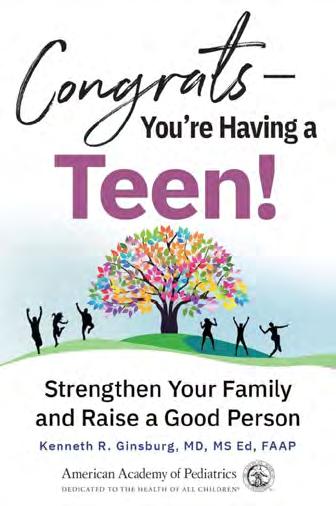
MCEC MCEC STORE STORE
25th Anniversary Mug $10.95
Celebrate our 25th anniversary with your very own coffee mug.
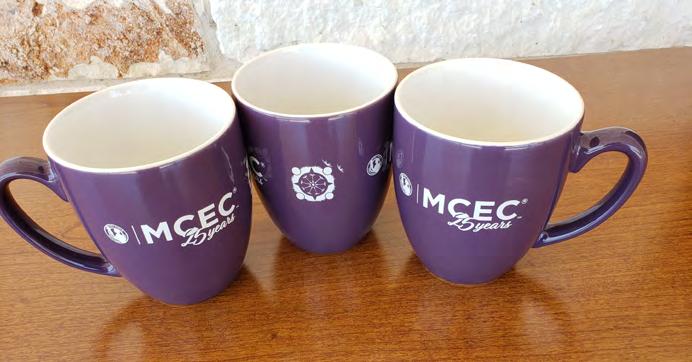
— Your Having aTeen!
$11.95
Congrats
by Dr. Ken Ginsburg
Soft heathered purple shirt comes in both V-neck: sizes S-2XL, Crew neck: S-3XL T-shirt $13.95
Visit our store TODAY!
DATE DATE THE

29-31, 2024
DC
JULY
WASHINGTON,
E


















 BY DR. ERIC M. FLAKE MCEC Board and Science Advisory Board Member
BY DR. ERIC M. FLAKE MCEC Board and Science Advisory Board Member










 BY KAREN KIRK MCEC Director of Marketing and Brand Creative
BY KAREN KIRK MCEC Director of Marketing and Brand Creative


































 TARA GLEASON Director of Programs Military Child Education Coalition
TARA GLEASON Director of Programs Military Child Education Coalition





 BY KAREN KIRK
Director of Marketing and Brand Creative
BY KAREN KIRK
Director of Marketing and Brand Creative










